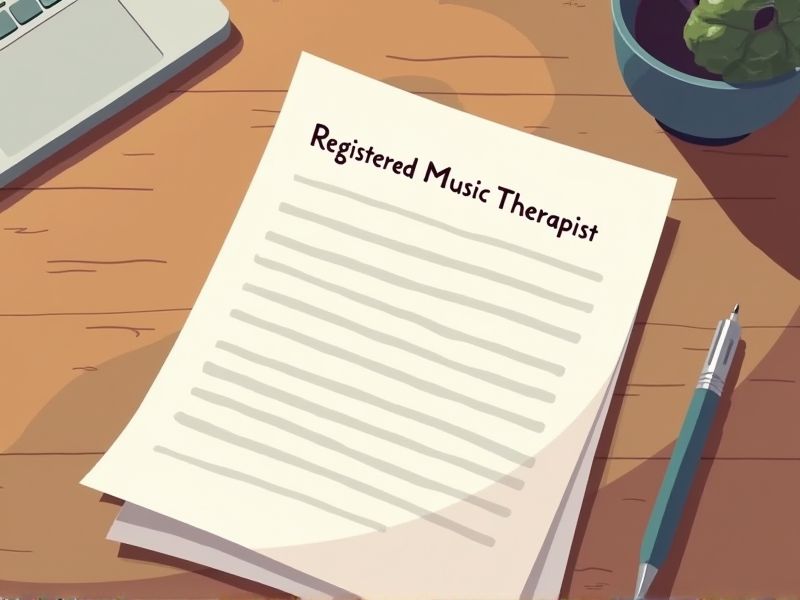
Registered Music Therapists use music to address emotional, cognitive, and social needs, and their specialized role necessitates a thorough understanding of both music and therapeutic techniques. Certifications ensure that therapists maintain professional standards and adhere to evidence-based practices. These credentials enhance credibility and provide clients with assurance of the therapist's expertise. Some important certifications required for Registered Music Therapists include the following.
Music Therapist-Board Certified (MT-BC)
A Music Therapist-Board Certified (MT-BC) credential ensures that a practitioner has met established educational and clinical standards, enhancing credibility within the healthcare community. This certification is critical in validating a music therapist's skills to handle complex therapeutic environments. Without MT-BC, a Registered Music Therapist might lack recognition from certain employers and insurers who require this standard as proof of competency. The credential also opens avenues for professional growth, as it reflects adherence to ongoing professional development and ethical practice guidelines.
Registered Music Therapist (RMT)
Music therapy involves tailored interventions, making the expertise of a Registered Music Therapist (RMT) crucial for effectively addressing diverse client needs. The RMT designation ensures the therapist has completed rigorous training and certification, guaranteeing professional competence. Without this credential, the therapeutic process may lack standardized approaches critical for therapeutic outcomes. The registered status provides clients and stakeholders with the confidence in receiving evidence-based, ethical, and safe music therapy services.
CPR Certification
Music therapists often work in environments where patients may have medical emergencies, such as hospitals or rehabilitation centers, necessitating CPR certification to respond promptly. Having CPR certification ensures music therapists can provide immediate assistance, potentially stabilizing a patient's condition until further medical help arrives. The presence of a certified individual during sessions may enhance patient and family peace of mind, knowing a trained professional is prepared for emergencies. CPR certification can also reinforce a therapist's credibility and demonstrate commitment to comprehensive patient safety and care.
Basic Life Support (BLS) Certification
Acquiring a Basic Life Support (BLS) Certification equips registered music therapists with essential life-saving skills, fostering a safer therapeutic environment for clients. Music therapists often work with individuals who may have underlying health conditions, increasing the need for immediate emergency response capabilities. The certification enhances a therapist's confidence and ability to act effectively in critical situations. Holding a BLS Certification often satisfies regulatory or institutional requirements, thereby expanding professional opportunities and credibility.
First Aid Certification
A First Aid Certification equips a registered music therapist with essential skills to handle medical emergencies, minimizing risks during therapy sessions. Music therapy often involves vulnerable populations; first aid knowledge ensures immediate and effective responses to incidents. Certification enhances professional credibility and aligns with healthcare industry standards, strengthening trust with clients and their families. The presence of certified first aid responders within therapy sessions can improve overall safety, fostering a supportive environment for client progress.
Mental Health First Aid Certification
Mental Health First Aid Certification equips registered music therapists with essential skills to recognize early signs of mental health issues, enhancing their ability to address clients' needs promptly. This training provides a comprehensive framework for responding to crisis scenarios, fostering a safer therapeutic environment. The certification increases the therapists' competency in implementing evidence-based intervention strategies, improving overall treatment outcomes. Acquiring these skills aligns with professional standards, ensuring music therapists are prepared for diverse and complex mental health challenges.
Trauma-Informed Care Certification
Trauma-informed care certification equips registered music therapists with the understanding of how trauma impacts brain function and behavior, enhancing their ability to tailor interventions effectively. This certification promotes safety and trust in the therapeutic relationship, essential for clients who have experienced trauma. Music therapists with this training can better identify and mitigate potential trauma triggers within therapy sessions. Organizations increasingly seek professionals with this qualification to ensure their staff can meet the diverse needs of trauma-affected clients.
Sensory Integration Certification
Sensory Integration Certification equips Registered Music Therapists with specialized skills to effectively address sensory processing disorders. This certification enhances their ability to design music interventions that are tailored to individual sensory needs. Therapists with this training can better support clients with autism and related conditions. Such expertise often leads to improved therapeutic outcomes and increased client satisfaction.
Autism Spectrum Disorder (ASD) Specialist Certification
Acquiring Autism Spectrum Disorder (ASD) Specialist Certification equips registered music therapists with specific skill sets to effectively engage and communicate with individuals on the autism spectrum. Enhanced understanding and knowledge of ASD interventions allow therapists to design tailored music therapy sessions that address unique needs and challenges. Certification provides credibility and assurance to clients and healthcare professionals regarding the therapist's expertise in handling ASD cases. With specialized training, therapists can better measure and evaluate progress in clients with autism, leading to improved therapy outcomes.
Certified Clinical Trauma Professional (CCTP)
The integration of Certified Clinical Trauma Professional (CCTP) training provides Registered Music Therapists with enhanced skills to address complex trauma symptoms effectively. Trauma-influenced clients often present with unique challenges that require specialized interventions, and CCTP certification equips therapists with evidence-based practices to meet these needs. Deepened trauma-awareness in music therapy facilitates more personalized and impactful treatment, ultimately leading to improved client outcomes. As trauma is prevalent among diverse populations, having CCTP-trained music therapists ensures that therapeutic services can reach individuals with varied traumatic experiences.
Summary
By obtaining certifications, you can enhance your credibility as a Registered Music Therapist, leading to increased trust from clients and employers. The certifications often result in an expanded skill set, enabling you to address a broader range of client needs. Employers may prioritize your qualifications during the hiring process, potentially leading to more job opportunities and career advancement. Your clients may experience improved therapeutic outcomes due to your advanced expertise.
